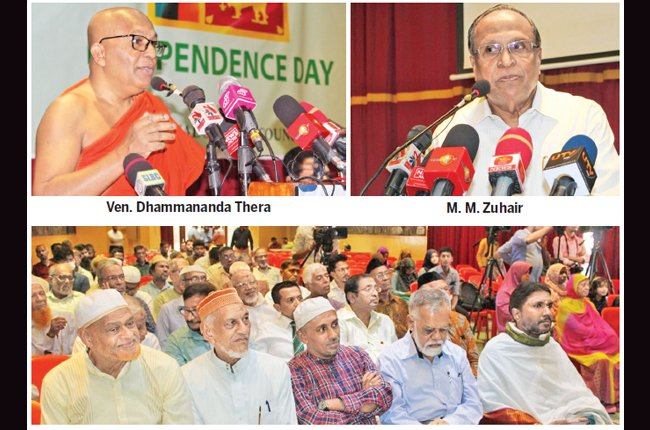“The struggle for freedom for the people of Sri Lanka was not over with the country gaining Independence in 1948. The freedom struggle must continue until every Sri Lankan believes and feels that he is an equal component of the country of his birth”.
This was stated by Walpola Rahula Institute of Buddhist Studies Director Ven. Galkande Dhammananda Thera addressing the 76th Independence Day meeting organised by the National Shoora Council (NSC) held at the J. R. Jayewardene Centre, Colombo on Wednesday (7). The event was presided over by NSC’s President Attorney T. K. Azoor.
Speaking further, Dhammananda Thera said, it is not important as to who came to this country first. History is full of episodes in which family rule controlled the lives of all others. What is important is to protect the territorial integrity of our country by treating all citizens as equals, irrespective of their birth or other factors.
Muslims and their national leaders have contributed substantially, he said, for protecting the freedom of this country. They have supported the struggle for freedom from foreign rule. They have worked with other national leaders for Sri Lanka’s independence. They must continue the struggle to preserve this freedom and to protect the rights of all in this country, Dhammananda Thera said.
Former MP M. M. Zuhair, PC addressing the gathering said that one of the earliest Sri Lankans to initiate the freedom struggle here was Sir Ponnambalam Arunachalam in 1893, followed in 1908 by Sir James Pieris, Sir Ponnambalam Ramanathan and in 1924 by Dr. T. B. Jayah and a number of others. It is noteworthy that these then leaders campaigned for political reforms not as spokespersons for any particular community but spoke for the country as a whole. Regrettably subsequent events failed to take advantage of the then emerging pluralistic foundation but took the nation on lines that eventually caused extensive damage to the country’s economy, for its peace and prosperity.
Zuhair said that historians such as Prof. K. M. de Silva, Prof. Sirima Kiribamune, Dr. Lorna Dewaraja and others have chronicled a number of significant contributions of the Muslims to the economic development of the country. Sir Alexander Johnston in a research article quoted by Dr. Lorna Dewaraja refers to the Yoda Wewa, constructed during the reign of King Datusena in the 5th Century, supplying water for agriculture for over 300 years after its construction, crediting the then Arabs living in Sri Lanka for their technological and financial support for the project. In the 7th, 8th and 9th Centuries, Muslims settled here as a trading community. Muslims set up handloom knitting in the 12th Century bringing expertise from India. An Italian explorer had recorded that in the 13th Century, the Kings had a number of Muslims serving in the defence sector.
He said that though this country has had a long history of invasions such as the Cholas and Pandyans from earliest times from the then divided India, today the territorial unity of India is the biggest security for our country.
We need also to recognize that over 450 years of the colonization of the region by three European powers have also contributed in many ways for the advancement of the country, though we have time and again divided our loyalties on communal lines.
A united Sri Lanka is our strength, he added. Sheikh S. H. M. Faleel, Islamic Studies Department Director Jaamiah Naleemiah, Beruwala, T. K. Azoor and NSC’s General Secretary Rasheed M. Imthiaz also addressed the gathering.




